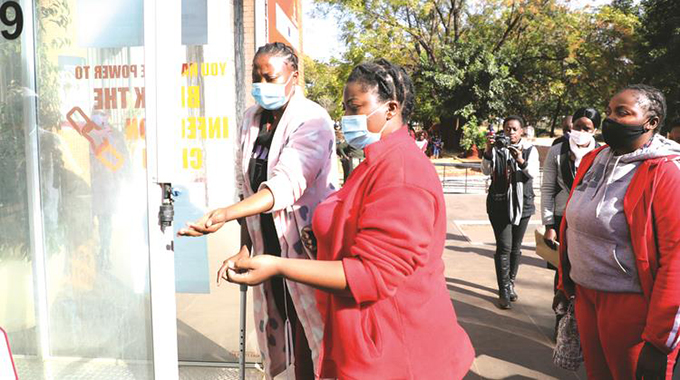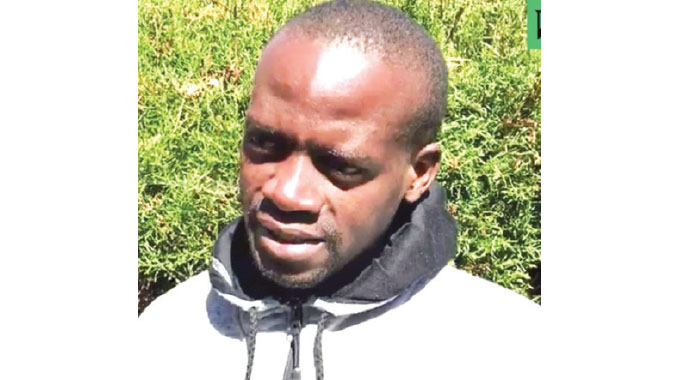Zimbabwe engineering student designs trolley disinfection machine to fight Covid-19

Sifelani Tsiko Innovations Editor
A final-year University of Zimbabwe masters’ electrical engineering student has designed an automated trolley disinfection machine to help fight Covid -19 pandemic at the country’s major shopping malls.
Tafadzwa Kavumbura, a final year Masters’ in Mechatronics and Artificial student developed a disinfection machine called the “Trolley Doctor” to help combat Covid -19 at supermarkets where the risk of spreading infections was high.
“This new design, we call the ‘Trolley Doctor,” does trolley disinfection automatically to promote safer shopping in the wake of COVID-19 Omicron pandemic. Trolleys are super-spreaders because everyone touches them,” he said.
“The machine is automated and contactless and is used for full disinfection of trolleys in a shopping mall. Once a trolley is detected by the machine it will automatically start the disinfection process which consists of a three-dimensional fogging unit.”
Kavumbura joins a growing league of young Zimbabwean innovators who are coming up with solutions to help the country cope with the growing coronavirus problem with innovations that include automatic sanitiser dispensers and medical robots.
“We want a Zimbabwe where we produce our own products. The Trolley Doctor is my second innovation product towards the fight against Covid-19. The first one has already hit the market and the response is impressive,” he said.
“It has motivated us to keep on pushing that’s why we have released the second one which is the Trolley Doctor. My first innovative product in the fight against COVID-19 has actually hit the market big time and you can find it at headquarters for Moonlight Funeral Assurance, National Prosecuting Authority and at the Zimbabwe Consolidated Diamond Company among other major companies.”

Dr Trolley automated machine.
Kavumbura graduated from UZ with a Bachelor’s degree in electrical engineering in 2019 and was now studying for a Masters in Mechatronics and Artificial.
He and his other colleagues have founded an engineering start-up – Solutrack Technologies where they are developing and selling their innovative products.
In 2020, Maxwell Chikumbutso, another young and gifted innovator also developed a prototype automated disinfecting machine to help fight the coronavirus pandemic.
The Automated Disinfecting Machine sought to help promote the use of advanced disinfection equipment for sanitisation works to be carried out smoothly and on a bigger scale to help prevent the spread of the Covid-19 pandemic.
Innovators at various universities in Zimbabwe have in the past few years developed a number of products to help fight the Covid -19 pandemic that includes the production of PPEs, masks, sanitisers, cough mixtures and a prototype ventilator.
The Harare Institute of Technology produced a prototype oxygen ventilator which was still undergoing trials.
Zimbabwe universities which for many decades were criticised as ‘degree factories’ with little generation of research and innovation are now increasingly coming with a number of major innovative products which have attracted global attention.
There has been strong advocacy towards what is termed Education 5.0. – an approach meant to see institutions of higher learning responding to the needs of societies they exist within through conversion of knowledge into goods and services.
In a major development for the country, the National University of Science and Technology (NUST) will this month start producing Polymerase Chain Reaction (PCR) kits for testing the Covid-19 virus while the Chinhoyi University of Technology (CUT) is set to start producing lithium-ion batteries and hydrogen mid this year.
Several projects were being coordinated at the country’s innovation hubs to come up with solutions to the country’s pressing problems in various sectors.
Government was stepping up its drive to encourage tertiary institutions to think outside the box and implement the results-oriented education 5.0 policy to build Zimbabwe into an upper-middle-class economy by 2030.










Comments